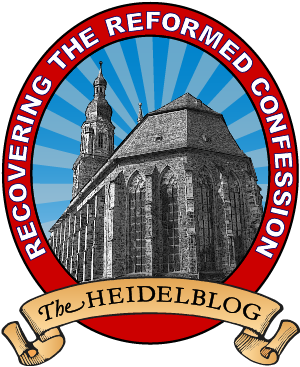This has been a strange week in Lake Wobegon. No sooner had the news emerged that an evangelical megachurch, James River Church (Springfield, MO) hired a male stripper/sword swallower—who, according to Julie Roys, “moonlights as a pole-dancing striptease artist at gay nightclubs”—to . . . Continue reading →
Heidelstuff
Words and Things December 2023—Acts 20:28
Our story begins in the dining room where Dr. and Mrs. Clark recently hosted my wife and I during our recent visit to Westminster Seminary California for a short teaching stint. Since we never want to pass up an opportunity to be . . . Continue reading →
At Work In The Fields Of The Lord
Great crowds, international fame, best-selling books, intense media attention, sniping critics, and simmering concerns among orthodox pastors all swirling around the arrival and work of a great and famous traveling preacher—these phenomena are well-known to us today, but they also marked the . . . Continue reading →
Why Did Arminianism “Win”?
Sometime back, Howard wrote to ask, “How and when did Arminianism become the predominate view?” That is a good question. First, we should distinguish between Jacob Arminius (James Harmenszoon, 1560–1609) and the Arminians (or the Remonstrants). Relative to the conclusions Arminian/Remonstrant theology later . . . Continue reading →
Words And Things: “Semantic Range” (Part 9)
Linguists have provided significant help to biblical scholars, not the least in the area of lexical semantics. Lexical here means words and phrases and semantics deals with meanings, so that lexical semantics is the study of how words mean. One area of . . . Continue reading →
Words And Things: All About Names (Part 8)
Last time, I mentioned that the great Aaronic benediction in Number 6:22–27 concludes with the wonderful line: “So shall they put my name upon the people of Israel, and I will bless them.” The notion of God putting his name upon someone . . . Continue reading →
Words And Things: All About “By” (Part 7)
I once preached through the book of Hebrews. When I arrived at the end of the book, I was very excited about preaching on the benediction in Hebrews 13:20–21. I love benedictions. If you study the “mother of all benedictions,” that of . . . Continue reading →
Words And Things: Practicing The Truth (Part 6)
Already in this series we have looked at two things that will be further illustrated here. First, we have to be very careful with the whole notion of a “literal” translation. Literal does not necessarily mean more accurate. The second thing is . . . Continue reading →
Words And Things: All About “This” (Part 5)
“This” is not very interesting. In fact, when studying a foreign language “this,” “that,” and “the other” are the kind of words that are easy to overlook and hard to memorize. Like “who,” “what,” or “why?” Why? In isolation, they seem abstract . . . Continue reading →
Make No Compromise With Sin—Judas, Revoice, and Raising the Black Flag
When the black flag was hoisted in warfare, it indicated no quarter would be given to the enemy. This is the sort of war we must make against our own sin, because sin seeks only to dominate us until it destroys us. . . . Continue reading →
A Sketch of the Christian’s Catechism (Ames)
William Ames (1576-1633) plays several crucial roles in the transmission and development of Reformed Orthodoxy. As a student of William Perkins, he carried forward Perkins’ strong Reformed theology. At the same time, Ames ministered among leading theologians in the Netherlands, combining both . . . Continue reading →
Discovering the Reformed Confession (Part 1): Young, Restless, and “Calvinistic”
I first heard the terminology of the “five points of Calvinism” in the mid-1990s from a youth pastor at our evangelical megachurch. He was convinced that Calvinism is true and biblical. One evening, my wife and I went to dinner with him . . . Continue reading →
Christians in Graduate School
Hello, we have not met. My name is Atlas. Pleased to meet you. I am currently enrolled in a graduate program at an elite university, and I have been asked to say a word or two about my experiences. Being a Christian . . . Continue reading →
Top 5 HB Posts For The Week Of February 27-March 5, 2023
Top 5 HB Posts For The Week Of February 27-March 5, 2023 Continue reading →
Is It A Sin If I Do Not Read The Bible Every Day?
As a young evangelical convert, I learned three things right away: God commands us to pray and read our Bibles every morning (the quiet time), if we listen closely enough we can hear direct revelation from God apart from Scripture (the still, . . . Continue reading →
Jon Moffit on Pietism and Assurance: Men’s Conference in Monroe, Michigan, March 3–4 2023
On the mountain, Jesus taught his disciples to “seek first the kingdom of God and his righteousness” (Matt 6:33). The overall aim of the Christian life is to pursue God’s kingdom, not our own kingdoms in this world. Turning away from ourselves, . . . Continue reading →
Review: J. M. Vorster’s The Gift of Life (Part 2): Postmodern Identity Politics Gets A Galatians 3:28 Makeover
At this point it is worth asking: What informs Professor Vorster’s overarching moral vision? Throughout The Gift of Life, the contention is that definitions of human dignity found in the liberal democratic and human rights traditions can be translated into Christian value . . . Continue reading →
Review: Lane Tipton’s The Trinitarian Theology of Cornelius Van Til
We live in an age that has lost the plot. In this case it is not the world at large, but rather the broadly Protestant/evangelical world in the West—many things taken almost for granted by previous generations of Christians are met with . . . Continue reading →
New: NTJ Volume 16 (No 4) For Fall 2022
The NTJ is not quite venerable but it is memorable and there is a new issue just before Autumn ends. It is perfect way to spend a cold and blustery day—inside with the NTJ, the HB, and catching up on the Heidelcast. . . . Continue reading →
Saturday Psalm Series: Queen Elizabeth And Psalm 23
We heard many stories about Queen Elizabeth II after her passing, but I do not know how many of you will know the story I am about to tell. Did you know that we have Queen Elizabeth II to thank for the . . . Continue reading →














